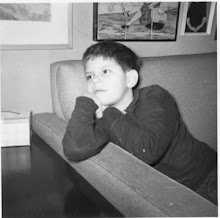
SOME THINGS I LEARNED ABOUT MAKING FEATURE FILMS
I wrote this in 1989 after completing my first (and only so far) feature film "Prisoners of Inertia", which I wrote and directed . I learned a lot being in the driver's seat of such a big rig. I used to distribute my list to students when I taught at the Columbia in the film program. It was printed in the student filmmaking manuel, but I thought it might be of use to any aspiring filmmakers who might drift through this blog.
Jeffrey Scher, CU Film Division adjunct professor and experimental filmmaker, shot a feature film several years ago. Shortly after, he jotted down what he'd learned. These are lessons worth repeating.
- Never endanger your own or your cast/crew's safety. If there's risk involved, find another way to do it.
- You set the tone for crew morale—be spirited, supportive, sensitive and sober. If the crew is with you, you'll have a better shoot and a better film.
- Never say No to an actor—always say Yes... and... It doesn't always matter whether you make the right or wrong choice on a tough call—as long as you are willing to make it work.
- Keep direction (to actors) private (between director and actor). It makes actors feel less "on the spot" and gives you more credibility.
- Dress warm: if it's hot, you can discard layers. If you're cold, you lose 35% of your brain functions.
- Plan but stay flexible: be prepared to react to—and incorporate—the unexpected.
- Let scenes play out. Don't jump on the end of a scene with Cut! Keep the tails on your scenes and you'll be much happier in the editing room.
- Think about transitions between scenes, or from scene to scene—especially with time transitions within locations.
- No smoking / drugs / alcohol on set.
- Eat normally—avoid the sugar ups and downs of the craft services table.
- Scripts are written on paper, not stone. Change things to make them work/fit your actors and location. Don't be afraid to respond to on-set revelations. Let actors participate—but then slip away to write actual changes or they will run you ragged.
- Lock away in the back of your mind just what it was about this film that excited you in the first place, as you're very likely to forget in the chaos of production.
- When the light is failing, it's quicker to move actors than to move the camera.
- You did three-quarters of your directing when you cast.
- Accept your choices and work with them and who they are—don't try to make quails out of flamingoes.
- Accept "gifts"—wonderful things that spring up on location. Just don't launch down endless tangents.
- Make triple sure all working props really work.
- Make sure the sound person gets quiet for room tone.
- Stills seem like the most insignificant element on the set, but if you don't get them then, they won't exist. And they're very important later.
- If you know a shot or sequence is important, don't let anybody talk you out of it.
- Accept compromises when you must. Just try to compromise with wit and optimism—and all the creativity you can muster.
- Every movie is 3 movies: the movie you write, the movie you shoot, and the movie you edit. Moments that seemed life or death issues on paper have a magical way on set of being irrelevant, and in the editing room, obtuse.
- Trust your instincts: first guess is always best.
- Remember: it's only a movie!



3 comments:
love the new shadow's dream film, featured it at the claw. great work, again!
many of your comments about making a movie as the director apply to the practice of architecture and running an office and getting something 'built'. being optimistic and working with respect for ea other are perhaps the most important. will copy them and look them over. thx- mark
Kaçak İddaa oynayıp parasını katlamak isteyen kullanıcılar doğru kaçak iddaa sitesi olarak buraya tıklayın.
Post a Comment